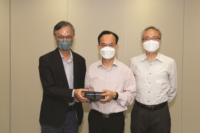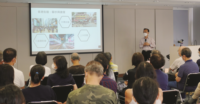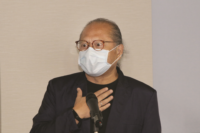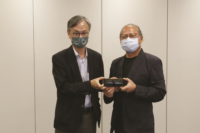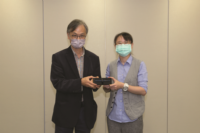Let’s Talk about Street and History: In Search of the Dynamism of Business and Culture in Hong Kong
Dr. Victor Zheng
On 29 September 2022, ICS Luncheon invited Dr. Victor Zheng as the speaker to deliver a talk on the history
of streets in Hong Kong.
Dr. Victor Zheng is the Associate Director (Executive) of Hong Kong Institute of Asia-Pacific Studies (HKIAPS), CUHK. He is also the Director of Centre for Social and Political Development Studies, and Co-Convenor of Global China Research Programme. His research interests are Chinese family business and inheritance, Hong Kong business culture and history, social indicators and social development, and global China studies.
During the Luncheon, Dr. Zheng introduced five streets in Hong Kong: Hollywood Road, Central-Mid-Levels Escalator and Walkway System, Bonham Strand, Nathan Road, and Waterloo Road. All these streets and roads contain pieces of Hong Kong history, allowing us to explore stories of entrepreneurs, changes in urban planning, and differences of government policies in various periods. Dr. Zheng emphasised that Hong Kong culture and history are not things that can only be found in textbooks; they exist in our daily lives. Streets are valuable resources for us to discover more about Hong Kong.
Actually, What is Chinese Music?
Prof. Frederick Lau
On 13 October 2022, ICS Luncheon invited Prof. Frederick Lau, Chair of the Department of Music, CUHK as the speaker to deliver a talk on Chinese music.
Prof. Lau is an ethnomusicologist, flutist, and conductor whose scholarly interests include a broad range of topics in Chinese, Western, and Asian music and cultures. He has published widely on issues related to music and identity, nationalism, modernisation, politics, globalisation, diaspora, musical hybridity as well as Western avant-garde music. He has received numerous research grants from agencies such as the National Endowment for the Humanities (NEH), the Scholarly Communication with the PRC, Freeman Grants, and the German Academic Exchange (D.A.A.D.). He served as the former book review editor of the Yearbook for Traditional Music and is the editor of a book series entitled Music and Performing Arts of Asia and the Pacific, University of Hawaii Press.
During the Luncheon, Prof. Lau stated that many people in Hong Kong label Chinese music as “boring” or “outdated”; they think it is something that can only be found in traditional Chinese opera. In reality, Chinese music comes in various forms as indicators of Chinese culture, reflecting characteristics of the different time period and regions. The answer to the question “what is music” is everchanging. We should not limit ourselves to
Western or modern music only, rather, we can try to appreciate Chinese music.
Canton Products and Sino-French Trade in the Qing Dynasty
Dr. Chou Ying-Ching
On 10 November 2022, ICS Luncheon invited Dr. Chou Ying-Ching as the speaker to deliver a talk on Canton Products and Sino-French Trade in the Qing Dynasty.
Dr. Chou is a Postdoctoral Fellow of Art Museum at CUHK. Her research interests are Qing imperial art, the
culture of Chinese collections, history of Chinese paintings and the exchange between East Asia and the West in early modern period.
During the Qing dynasty, Guangzhou was designated as the sole trading port with foreign countries. There is an increasing demand for Canton Products, which refer to luxury goods that were produced in Guangzhou. Using looking glass and glass mirrors as an example, Dr. Chou explained that Chinese artists learned and preserved glass-making techniques from Europe. Europeans were amazed to find out that their long-lost art can be found in Guangzhou, and as a result, marchand-merciers such as Compagnie des Indes Orientales massively bought Canton Products and shipped them back to France for bidding. Purchasing Canton Products thus became an unstoppable trend in European countries.
Sino-French Trade in the Qing dynasty is a unique experience. Not only did Chinese artists absorb glass manufacturing methods and painting techniques from Europe, they also localised the products and exported them back to Europe. It is an example of how economic development and cultural reservation can be achieved at the same time.
|












